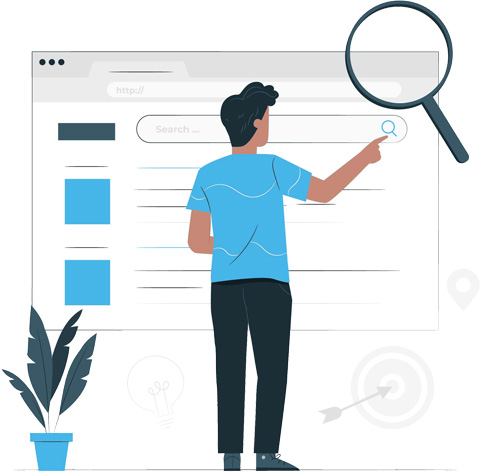
Why Is On-Page SEO Important?
On-page SEO is vital because it provides search engines with many signals to help them understand the context and meaning of your pages. This understanding is critical because search engines don’t “see” web pages like humans do; they require specific elements to derive meaning.
By optimizing these elements — which include your title tags, content, internal links, and the structure of your URLs — you make it easier for search engines to crawl and index your pages, ultimately improving your site’s ranking.
Plus, effective on-page SEO also enhances user experience, making it more likely for visitors to stay, engage with your content, and convert — which boosts your site’s credibility and ranking even further.
On-Page SEO Techniques You Should Know
Thorough knowledge and application of these techniques ensure higher traffic, improved user experience, and increased conversion rates. Understanding these strategies can make the difference between your site being on the first page of search results or getting lost among countless others.

Align With Search Intent
When optimizing your pages, always consider the intent behind a user’s search query. What are they looking for? What information do they need? Your content should meet those needs and provide value to the searcher.

Write Unique, Helpful Content
Create high-quality, informative content that adds value to your audience. This attracts more visitors and encourages them to engage with your website and share it with others.

Place Target Keywords Strategically
Research and use relevant, high-volume keywords throughout your content, particularly in titles, headings, and meta descriptions. But don’t overdo it; keyword stuffing can hurt your ranking.

Write Keyword-Rich Title Tags
Title tags are crucial as they appear on the search engine results page (SERP), making them a significant factor in user click-through rates. Keep them short, unique, descriptive, and include your primary keyword.

Write Click-Worthy Meta Descriptions
Similarly, meta descriptions appear on the SERP and summarize your page’s content. Make them compelling and relevant to entice users to click through to your site.

Use Internal Links Effectively
Linking internally between pages within your website helps search engines understand the relationship between your content and improves user navigation.

Create a Visual Hierarchy Using H1–H6 Tags
Use a logical hierarchy of headings to break up content, making it easier for search engines and users to understand the structure and context.

Optimize Your URLs
Keep your URLs simple, descriptive, and relevant to the page’s content; this helps search engines and makes it easier for users to remember and share.

Add Internal Links
Linking internally between pages within your website helps search engines understand the relationship between your content and improves user navigation.

Use External Links to High-Authority Sites
Linking to reputable sources adds credibility to your content and improves your website’s ranking.

Include and Optimize Images
Utilizing images in your content enhances the aesthetic appeal and significantly improves user engagement.

Use Descriptive Filenames
A relevant filename helps search engines understand the subject of your image.

Use Descriptive Alt Text
Alt text serves as an alternative description for images that can’t be displayed (due to slow load times, broken files, or assistive technologies used by visually impaired users).

Compress Images
High-resolution images can significantly slow down your page load speed — a key factor for SEO and user experience. Use compression tools to reduce the file size of your images without sacrificing their quality.
Advanced On-Page SEO Tactics
Search Engine Optimization (SEO) is a dynamic field constantly evolving. However, on-page SEO remains critical in how your website ranks on search engine results pages (SERPs). Here are some advanced on-page SEO tactics you can use to improve your website’s visibility and ranking.
Optimize for Page Speed
Page speed is an essential factor in SEO. A slow-loading website frustrates visitors and negatively impacts your site’s SERP rankings. Google and other search engines prioritize websites that provide a good user experience; fast loading times are a big part.
Use tools like Google PageSpeed Insights or GTmetrix to optimize your page speed and identify issues slowing down your site. These could include unoptimized images, excessive HTTP requests, or unnecessary JavaScript.
Target Featured Snippets
Featured snippets are a type of SERP feature that displays a summary of an answer to a user’s query directly on the Google results page. These snippets aim to answer the user’s question without them having to click through to a website.
Structure your content to answer specific questions concisely and clearly to optimize for featured snippets. Often, Google pulls these answers from FAQ sections or well-structured bullet points.
Get Rich Snippets with Schema Markup
Rich snippets are search listings that provide more information than the standard listing. This additional information, such as reviews and ratings, is made possible by schema markup.
Schema markup is a form of microdata that helps search engines understand the content on your page and provide more informative results for users. Implementing schema markup can increase your click-through rates and improve your overall SEO.
Monitor and Update Content
Content freshness is another factor that search engines consider when ranking pages. Regularly updating your content keeps it relevant and valuable to your audience and signals to search engines that your website is maintained and up-to-date.
Make it a habit to review and update your content regularly. This could involve adding new information, updating outdated facts, or improving the overall quality of your writing.
Optimize for Featured Snippets; Make it Informative and Professional
As mentioned, featured snippets are a great way to gain visibility on SERPs. However, it’s not just about getting your content into the snippet; it’s also about professionally providing value.
Ensure your content is well-written and informative and provides a direct answer to commonly asked questions in your field. Use clear formatting, like bullet points or subheadings, to make your content easy to read and understand.
By implementing these advanced on-page SEO tactics, you can improve your website’s visibility on SERPs, attract more organic traffic, and ultimately increase conversions. Remember, SEO is an ongoing process and requires consistent effort and optimization.




